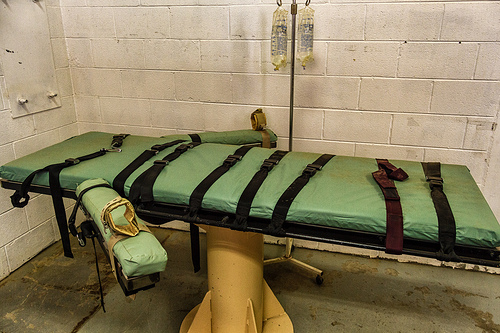59-year-old Rommel Broom’s lethal injection six years ago was called off by the warden after 18 punctures over two hours trying to find a suitable vein. Both sides who came before the Ohio Supreme Court agreed that the state didn’t follow its own rules on executions in that case. But the arguments before the Court were about whether the state gets to try again to carry out Broom’s death sentence for murdering 14 year old Tryna Middleton of Cleveland, who was walking home from a high school football game in 1984 when Broom kidnapped her at knifepoint, then raped and killed her.
The double jeopardy debate
Adele Shank represents Rommel Broom, and says there are two reasons why a second execution attempt would be unconstitutional. “Broom has already been through a seriously cruel and tortuous execution process that entailed everything except the final step of the execution process,” Shank said. “Putting him through it again would be double jeopardy, but perhaps more importantly, it would be cruel and unusual to put this person through this process a second time.” And Shank says since the state called off the execution because it wasn’t following its own execution protocol, that means double jeopardy has been attached, just as when a prosecutor makes a mistake and a mistrial is called.
Defining the punishment
Christopher Schroeder represents the state. He doesn’t dispute that the state scrapped the execution because of “inadvertent violations of the protocol”, but that doesn’t mean a second execution attempt can’t go forward. “Double jeopardy precludes multiple punishments. He’s only gotten one punishment and that’s death. He wasn’t sentenced to have needles stuck in his arms – he was sentenced to die,” Shroeder said. “In fact, in 1985 lethal injection wasn’t even available in Ohio. The sentence was the electric chair, and that’s what he received. He hasn’t received that punishment yet. That’s why there’s no double jeopardy.”
A failed execution
 Schroeder says Broom experienced “minor difficulties” in the previous attempt, and they didn’t constitute cruel and unusual punishment. But Broom has said the repeated needle pricks caused him pain so intense he cried and screamed. And Shank told the court that while prison staff got a break during that two hours long attempted execution, Broom didn’t – he was still strapped to a gurney surrounded by people, in her words, who were trying to kill him. And Shank says that left him with psychological trauma that would make a second execution attempt unconstitutional. “The United States Supreme Court recognized long ago that psychological torture, that the fear, ever increasing fear and distress – in a different context – violates the Eighth Amendment. What could be worse than having been through this horrifying experience and then be brought back into the same room?” Schroeder says Broom experienced “minor difficulties” in the previous attempt, and they didn’t constitute cruel and unusual punishment. But Broom has said the repeated needle pricks caused him pain so intense he cried and screamed. And Shank told the court that while prison staff got a break during that two hours long attempted execution, Broom didn’t – he was still strapped to a gurney surrounded by people, in her words, who were trying to kill him. And Shank says that left him with psychological trauma that would make a second execution attempt unconstitutional. “The United States Supreme Court recognized long ago that psychological torture, that the fear, ever increasing fear and distress – in a different context – violates the Eighth Amendment. What could be worse than having been through this horrifying experience and then be brought back into the same room?”
The actual sentence
But Schroeder said the bottom line is that Broom was sentenced to death – not to having needles put in his arms. So he said another try at that sentence, which has been upheld multiple times in the three decades since Tryna Middleton’s rape and murder – is appropriate. “As far as cruel and unusual punishment, I think it would make a mockery of justice to say that a delay caused by trying to protect this man’s rights and uphold the Eighth Amendment itself is what violates the Eighth Amendment,” he said. “That creates a terrible incentive for the state to go ahead and try and execute these people even if there is difficulty in establishing a vein.”
The state's next move
Schroeder says if the state loses, it will appeal to the US Supreme Court. There is only one other case of an inmate who essentially survived an execution, and it happened under very different circumstances. In 1949, 18 year old Willie Francis was set to die in Louisiana’s electric chair, that though electricity was going through the chair, it didn’t kill him. A sharply divided US Supreme Court ruled the state could try again, and Francis was executed a year later. |